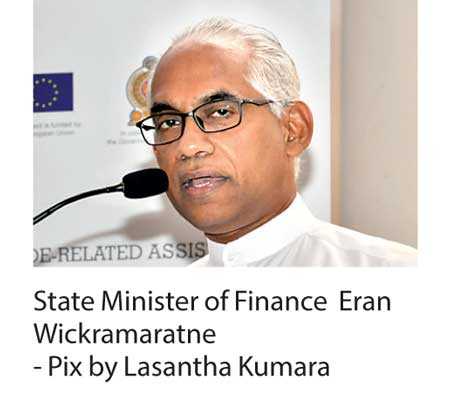Friday Feb 27, 2026
Friday Feb 27, 2026
Wednesday, 3 October 2018 00:00 - - {{hitsCtrl.values.hits}}
 State Minister of Finance Eran Wickramaratne yesterday urged the shipping industry to embrace liberalisation, saying it benefitted all and aided the country’s push to become a maritime and logistics hub.
State Minister of Finance Eran Wickramaratne yesterday urged the shipping industry to embrace liberalisation, saying it benefitted all and aided the country’s push to become a maritime and logistics hub.
Speaking at the national public-private dialogue on maritime, logistics and transport reform held under the EU-funded Trade Related Assistance Project implemented by the International Trade Centre, he said one of Sri Lanka’s greatest resources was its strategic location within the Indian Ocean but the country captured only a small amount of transshipment containers while the full potential of the maritime and logistics industry remained unfulfilled.
“The key objective of the current administration is to develop Sri Lanka into the maritime and trading hub of the Indian Ocean. To achieve this vision we need to invest and reform our offering along the maritime and shipping value chain,” Wickramaratne emphasised.
“To become a maritime hub, we need to move from merely providing basic transshipment services and provide more value added services. Under the current regime global companies do not have the incentive to directly invest in the logistics space in Sri Lanka due to the minority equity ownership,” he stressed.
He also opined that the current pricing structure in the shipping agency fee was controlled by administered prices and “this artificial pricing mechanism does not reflect the current market status.”
“The industry is controlled largely by domestic players. There is a lack of foreign participation in the agency business,” he said, adding that the lack of foreign participation leads to an opportunity.
“By removing the restrictions of the 40% foreign equity ownership, as proposed in 2018 Budget, there will be more competition which will result in a lower cost, higher efficiencies and higher quality services, all of which are beneficial for exporters and importers,” he stressed.
Wickramaratne said that decreasing export costs encourages export competitiveness of Sri Lankan companies and products, enabling local entrepreneurs to provide products at more competitive prices.
Whilst acknowledging that there has been much debate since the 2018 Budget proposal, many leading export sectors such as tea and apparel have welcomed the liberalisation of the shipping agency business.
“You can either be proactive and act now and continue to grow our market share, but look back with regret years later. This is a difficult juncture for this industry but this is not new for Sri Lanka. Sri Lanka has been here before,” recalled the State Minister of Finance.
“These debates are not just about the shipping industry, but the future of the country and society. Do we protect the status quo and pass on the legacy to our children or do we create a new society? It is clear that liberalisation in the agency business is a key steppingstone for us to develop Sri Lanka into a maritime and trading hub of the Indian Ocean, allowing for foreign ownership,” stressed Wickramaratne.